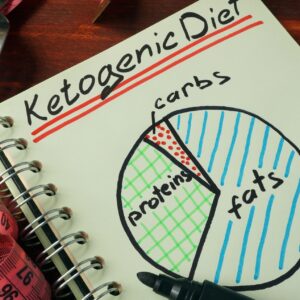Index
Leaky gut, also known as increased intestinal permeability, occurs when the tight junctions in the intestines begin to loosen. This allows undigested food particles, toxins, and bacteria to enter the bloodstream. Leaky gut is associated with an increased risk of autoimmune diseases, including celiac disease, diabetes, and rheumatoid arthritis. A leaky gut diet improves digestive health and reduces systemic inflammation.

Symptoms of Leaky Gut
A leaky gut causes various symptoms, which can occur with several other health conditions. Common symptoms include-
- Food Allergies
- Digestive Problems
- Skin Issues
- Mood Issues
- Neurological Problems
- Nutritional Deficiencies

Causes of Leaky Gut
Numerous factors can impact gut health. These factors can decrease digestion, increase systemic inflammation, and alter the bacteria in the gastrointestinal tract.
- Artificial food additives
- Changes in your microbiome due to an extended illness or antibiotic usage
- Excess alcohol consumption
- Excess exercise
- Excess sugar
- Gluten
- High-fat diet
- Low dietary fiber
- Low vitamin D levels
- Medications, including proton pump inhibitors and NSAIDs
- Obesity
- Processed foods
- Smoking
- Stress

Leaky Gut Diet Options
Inflammation causes the digestive lining to become more permeable; therefore, it is essential to look into decreasing systemic inflammation. Reducing inflammation is accomplished by establishing a proper diet, getting a whole night’s rest, and creating an appropriate exercise regimen. Reducing stress levels and improving overall mental health can also help reduce inflammation. Finally, your functional medicine practitioner will help guide you on how your dietary choices impact gut health. Below are some diets that can help heal your digestive tract.
Autoimmune Protocol Diet
This diet focuses on decreasing systemic inflammation, which is the cause of numerous autoimmune diseases. The Autoimmune Protocol Diet (AIP) helps to calm the immune system and repair the leaky gut. Nutrient-dense foods enhance the good bacteria in the digestive tract. This diet eliminates food additives, gluten, grains, dairy products, legumes, oils, sugar, nightshade vegetables, and sweeteners.
Low FODMAP Diet
FODMAPs are a group of carbohydrates that cause excess gas and other digestive problems. They are an acronym for naturally fermentable carbohydrates such as Fructose, Oligosaccharides, Disaccharides, Monosaccharides, and Polyols. Finding low-FODMAP foods can be difficult, so working with a healthcare practitioner is best. A low-FODMAP diet helps improve gut health by supporting the beneficial bacteria in your gastrointestinal tract to thrive and multiply.
Gluten-Free Diet
Gluten is a naturally occurring protein in various grains, including wheat, rye, and barley. Researchers have linked it to leaky gut in individuals with celiac disease and gluten sensitivity. Gluten is also a highly inflammatory food, and when consumed, it causes inflammation throughout the body, including at tight junctions. A gluten-free diet can decrease systemic inflammation and help improve leaky gut syndrome.
Ketogenic Diet
The ketogenic diet, known as Keto, is popular for losing weight. However, it can also help heal the digestive tract, improve gut bacteria, and enhance overall health and well-being. The keto diet involves eating minimal carbohydrates, limiting protein, and increasing high-quality fats. It works by burning excess fat for energy while suppressing hunger.
Specific Carbohydrate Diet
The Specific Carbohydrate Diet (SCD), developed approximately 100 years ago, reduces inflammation, helps heal, and restores the tight junctions in the intestines. Originally designed to relieve celiac disease, it also eases several conditions, including irritable bowel syndrome. The SCD is not a low-carb diet but focuses on choosing simple, easily digested carbohydrates. It eliminates dairy products, sugars, and all grains. Studies have shown that diet plays a role in the inflammatory process.
Elemental Diet
The elemental diet uses predigested foods to ease the strain on the digestive tract. Your doctor may prescribe an elemental diet in powder or liquid form, which can be consumed or given through a feeding tube. The diet helps to improve digestion and heal the digestive tract.
Whole 30 Diet
The Whole 30 diet is a healthy eating program designed to heal your gastrointestinal tract while improving your overall health. This program eliminates various foods, including additives, alcohol, dairy, grains, legumes, and sugar, for thirty days. After the initial thirty days, you add foods one at a time to see how you feel after consuming the food item. The diet aims to remove problematic foods and eat a diet filled with nutrient-dense and unprocessed foods. The reintroduction period helps determine any food sensitivities causing inflammation and leaky gut.

Holistic Treatment for Leaky Gut Syndrome
A leaky gut occurs when the tight junctions are inflamed, leading to systemic inflammation and health imbalances. The good news is that the digestive lining has a fast turnover rate and wants to heal itself. We need to give it the proper tools for healing to happen. Eating a diet that helps reduce inflammation and is easy on digestion can help repair a leaky gut naturally.
Our functional medicine practitioners help evaluate the root cause of your leaky gut and digestive disorders. They discuss your diet and lifestyle choices and work with you to create a customized leaky gut diet and lifestyle modification plan to promote healing and improved digestion.
























